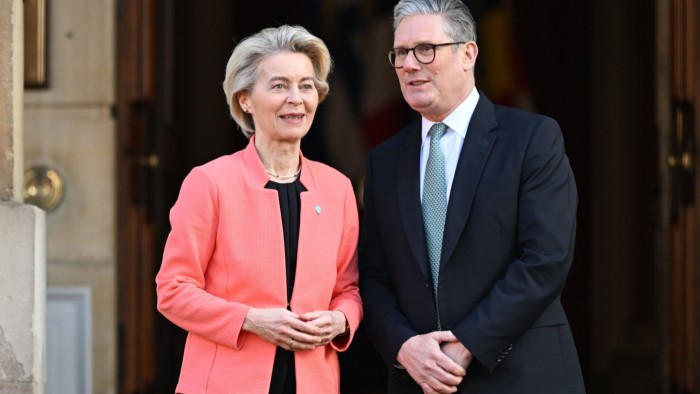Good morning. US President Donald Trump has publicly attacked Ukraine’s Volodymyr Zelenskyy for refusing to recognise Russia’s illegal occupation of Crimea. As we report this morning, that outburst has exacerbated the existential dilemma facing European capitals: how to support US efforts to end the war and stay on good terms with Washington, while also adhering to international law and long-standing promises to Kyiv.
Today, our energy correspondent reports on Ursula von der Leyen’s multi-objective, highly-energetic trip to London, and our Iberian reporter brings news of Portugal’s decision to take advantage of more flexible fiscal rules for defence spending.
Warm up
European Commission president Ursula von der Leyen travels to London today to ostensibly present her views on energy security, but a related meeting with Sir Keir Starmer could well prove more impactful, writes Alice Hancock.
Context: The International Energy Agency’s energy summit is almost a year in the making, and comes as energy security is increasingly pivotal in relations between Russia, the US and the EU. The event also comes less than a month before the first EU-UK leaders’ summit since Brexit.
UK premier Starmer and von der Leyen are expected to use bilateral talks today to finalise plans for a new post-Brexit strategic alliance, as the UK and the EU close in on a defence and security pact and a deal on fishing rights, to be agreed by leaders at the May 19 summit. That could then pave the way for negotiations on a broader economic deal, officials said.
One EU official said that “many matters” will be discussed by the two leaders during today’s bilateral meeting slated to last an hour, “starting with Ukraine”.
Energy is also likely to be raised, with North Sea states such as Belgium and the Netherlands particularly keen on progress in this area at the May summit. Companies on both sides of the Channel have long complained that post-Brexit energy trading arrangements are holding up new projects and increasing costs for consumers.
At the IEA event, von der Leyen and Starmer will each give a speech, with the commission president expected to address difficulties over electricity pricing and the need to co-operate in the North Sea.
She will also nod to transatlantic relations, saying that the bloc “has not forgotten” how the US stepped in to supply gas as Russia cut pipeline flows following its full-scale invasion of Ukraine.
“These energy partnerships, including imports of LNG from the United States, remain of strategic importance for the European Union,” she will say.
No state secretaries from the US will be present but officials from the US department of energy and state department will attend.
Chart du jour: Meddling
Executive over-reach is a theme these days. The latest to join the meddling crowd is Italy’s Prime Minister Giorgia Meloni, who has invoked “golden power” rules to hobble lender UniCredit’s €14bn bid for smaller rival BPM, writes Lex.
Fiscal first-movers
Portugal has become the first country to ask the European Commission to activate a so-called escape clause allowing higher defence spending, as pressure mounts on Nato laggards to meet the alliance’s two per cent of GDP target, writes David Sharrock.
Context: As part of measures aimed at encouraging higher defence spending, Brussels has proposed allowing member states to increase military spending by 1.5 per cent of GDP each year for four years, without the threat of disciplinary steps that normally kick in once a government deficit climbs above 3 per cent of GDP.
Portugal spent just 1.55 per cent of GDP on defence last year. Last month finance minister Joaquim Miranda Sarmento told the Financial Times that defence spending must not threaten its fiscal surplus or add to the debt burden, while insisting it still had room to meet higher Nato expenditure targets, as Donald Trump pressures Europe to pay more for its security.
Lisbon’s announcement that it would apply for the fiscal loophole followed Spain’s Prime Minister Pedro Sánchez vowing that his country would reach the 2 per cent target this year, spending nearly €10.5bn more, while not reducing the welfare budget. It currently has the lowest defence spending in Nato at only 1.3 per cent.
Italy, another defence spending laggard, has said it will not ask Brussels for the budget escape clause.
At a summit in June, Nato leaders are expected to raise the spending target to at least 3 per cent of GDP, while Trump has suggested a higher target of 5 per cent.
Portugal’s centre-right government said the decision had been agreed upon with the opposition socialist party. The country will hold a general election next month.
What to watch today
-
Summit on the Future of Energy Security in London.
-
Nato secretary-general Mark Rutte travels to Washington for two-day visit.
-
G20 finance ministers meet in Washington on the sidelines of the IMF/World Bank Spring Meetings.
Now read these
Are you enjoying Europe Express? Sign up here to have it delivered straight to your inbox every workday at 7am CET and on Saturdays at noon CET. Do tell us what you think, we love to hear from you: europe.express@ft.com. Keep up with the latest European stories @FT Europe




